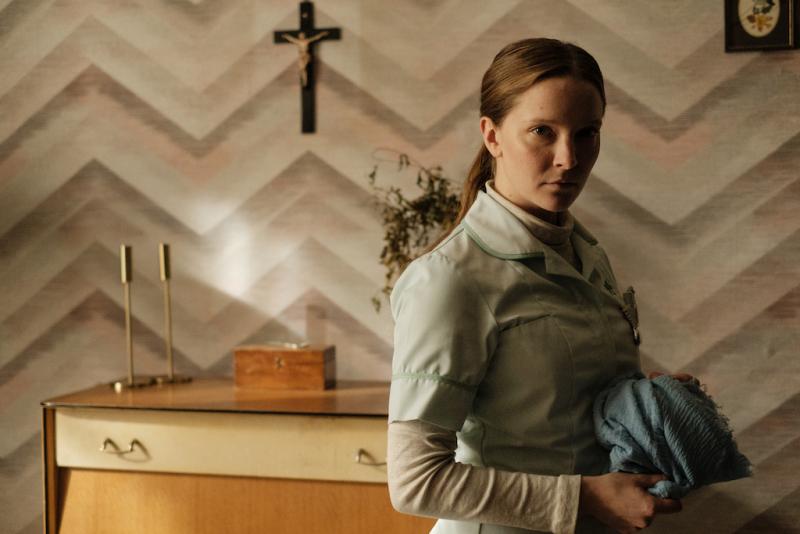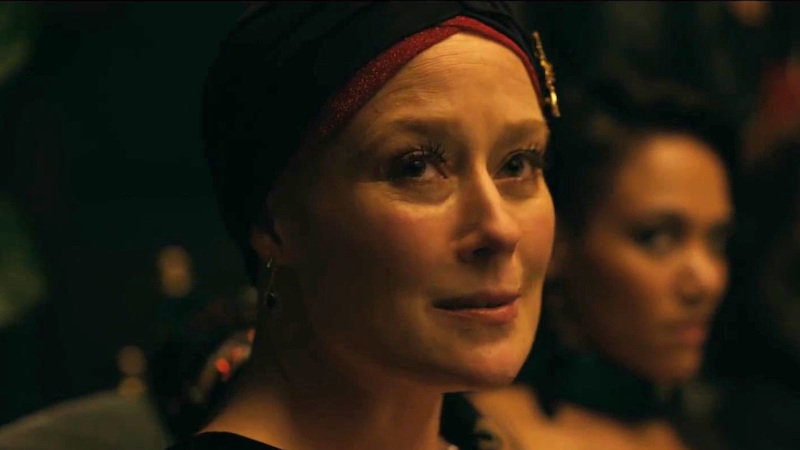Saint Maud review - creepy and strangely topical psychological horror | reviews, news & interviews
Saint Maud review - creepy and strangely topical psychological horror
Saint Maud review - creepy and strangely topical psychological horror
Morfydd Clark is the troubled nurse with dangerously novel ideas about palliative care

It only takes a few seconds of Saint Maud – dripping blood, a dead body contorted on a gurney, a young woman’s deranged face staring at an insect on the ceiling, an industrial clamour more likely to score the gates of hell than the pearly ones – to make us realise that the film’s title is a tad ironic.
That irony will become even sharper, and mordantly witty, when we find that for the eponymous hospital nurse turned private carer (references no doubt fudged for the private sector), sainthood would be most welcome.
“What’s the plan?” she asks of God, with whom she frequently converses, in and out of prayer. “You saved me for something greater than this.”
This, is a routine English seaside town, where the mousey, intense, alienated Maud (Morfydd Clark) is a fish out of water amongst the tacky arcades, fish and chips and bar life; her home, a narrow, depressing bedsit, which oftimes has the claustrophobic feel of a prison cell. But after that startling prologue, we find Maud packing her case for her next, live-in assignment. And at least a bit more space.
Amanda (Jennifer Ehle, pictured below) is an American in the last stages of a terminal illness, alone in her large pile in the hills above the town. At first glance, the nurse is unimpressed. “Dancer, choreographer, minor celebrity,” she reports to the voice inside her head. “As you know, I have very little time for creative types, as they tend to be rather self-involved.”
 The chain-smoking patient certainly has a touch of the Norma Desmond in her affectations, and a defiantly hedonistic side that horrifies Maud. However, when Amanda shows polite curiosity in her carer’s faith, Maud sees her chance. “Don’t get me wrong. Palliative care is noble work.” To God again. “But to save a soul: that’s quite something.”
The chain-smoking patient certainly has a touch of the Norma Desmond in her affectations, and a defiantly hedonistic side that horrifies Maud. However, when Amanda shows polite curiosity in her carer’s faith, Maud sees her chance. “Don’t get me wrong. Palliative care is noble work.” To God again. “But to save a soul: that’s quite something.”
It’s been a year since writer/director Rose Glass’s feature debut premiered at the 2019 London Film Festival, where this cracking psychological horror won an honourable mention in the best film competition. It’s now in cinemas and, COVID-permitting, really should be seen on a big screen, where Glass’s expert command of atmosphere, tension and horror set-piece can be best experienced. She’s a very exciting new British talent.
There are some clear inspirations, from Polanski and Friedkin to Peter Strickland. At the same time, Glass’s filmmaking is quite singular (it’s worth checking out her acclaimed short film, Room 55, online) with a carefully considered aesthetic, a strangeness and a tightly-coiled chill all its own; and in this film her writing cannily uses the horror genre to investigate something that society is desperately trying to get to grips with right now, mental illness.
Despite the amusing one-liners, there’s no doubt that Maud is an isolated and very disturbed young woman, her new-found religious fervour filling a deep well of need and desperation, yet sending her full-pelt towards psychosis. When she prays, “Don’t let me fall”, it's with a pathos that cuts to the quick. There is evidence of self-harm, with more to come, as inevitable rejection will send her over the edge. But to whom is Maud the biggest danger – herself, or others?  Glass imbues the character with ambiguity, the chief question being whether Maud’s visions and physical experiences – including two fabulous, hair-tingling moments straight out of The Exorcist – are a matter of fantasy or some genuine religious ecstasy.
Glass imbues the character with ambiguity, the chief question being whether Maud’s visions and physical experiences – including two fabulous, hair-tingling moments straight out of The Exorcist – are a matter of fantasy or some genuine religious ecstasy.
This ambiguity is heightened by the mood created by Glass and her production team. Every horror needs a good house: with Amanda's, production designer Paulina Rzeszowksa has created interiors that can seem spacious and stylish one moment – with an intricately patterned, retro vibe – but whose muted colours can suddenly become drab and forebidding. Cinematographer Ben Fordesman casts some impressive shadows, while tipping his image sideways, upside down, into deep focus and uncompromising close-up, all delineating Maud’s state of mind – as does composer Adam Janota-Bzowski’s atonal soundscape, whose jarring bursts of what sounds like foghorn evokes the score of another recent, top-notch psychological horror, The Lighthouse.
Morfydd Clark has been excelling in supporting roles for a time now (Love & Friendship, His Dark Materials, The Personal History of David Copperfield) so hats off to Glass for bringing the actress front and centre. Using her lilting, slightly childlike Welsh accent to good effect, Clark gives a finely-detailed, discomforting, edge-of-the-cliff portrayal of a woman at once vulnerable and dangerous. She’s well-matched by Ehle, bedbound but deliciously effective as another character who plays with our sympathies.
Also to her credit, Glass doesn’t rush for a body count or easy thrills, taking her time, slowly cranking up the creepiness and disturbance. When the conclusion comes, it's with a heartrending, terrible logic.
rating
Explore topics
Share this article
The future of Arts Journalism
You can stop theartsdesk.com closing!
We urgently need financing to survive. Our fundraising drive has thus far raised £49,000 but we need to reach £100,000 or we will be forced to close. Please contribute here: https://gofund.me/c3f6033d
And if you can forward this information to anyone who might assist, we’d be grateful.

Subscribe to theartsdesk.com
Thank you for continuing to read our work on theartsdesk.com. For unlimited access to every article in its entirety, including our archive of more than 15,000 pieces, we're asking for £5 per month or £40 per year. We feel it's a very good deal, and hope you do too.
To take a subscription now simply click here.
And if you're looking for that extra gift for a friend or family member, why not treat them to a theartsdesk.com gift subscription?
more Film
 London Film Festival 2025 - crime, punishment, pop stars and shrinks
Daniel Craig investigates, Jodie Foster speaks French and Colin Farrell has a gambling habit
London Film Festival 2025 - crime, punishment, pop stars and shrinks
Daniel Craig investigates, Jodie Foster speaks French and Colin Farrell has a gambling habit
 I Swear review - taking stock of Tourette's
A sharp and moving tale of cuss-words and tics
I Swear review - taking stock of Tourette's
A sharp and moving tale of cuss-words and tics
 A House of Dynamite review - the final countdown
Kathryn Bigelow's cautionary tale sets the nuclear clock ticking again
A House of Dynamite review - the final countdown
Kathryn Bigelow's cautionary tale sets the nuclear clock ticking again
 theartsdesk Q&A: Idris Elba on playing a US President faced with a missile crisis in 'A House of Dynamite'
The star talks about Presidential decision-making when millions of lives are imperilled
theartsdesk Q&A: Idris Elba on playing a US President faced with a missile crisis in 'A House of Dynamite'
The star talks about Presidential decision-making when millions of lives are imperilled
 Urchin review - superb homeless drama
Frank Dillane gives a star-making turn in Harris Dickinson’s impressive directorial debut
Urchin review - superb homeless drama
Frank Dillane gives a star-making turn in Harris Dickinson’s impressive directorial debut
 Mr Blake at Your Service review - John Malkovich in unlikely role as an English butler
Weird comedy directed by novelist Gilles Legardinier
Mr Blake at Your Service review - John Malkovich in unlikely role as an English butler
Weird comedy directed by novelist Gilles Legardinier
 Don't Let's Go to the Dogs Tonight review - vivid adaptation of a memoir about a Rhodesian childhood
Embeth Davidtz delivers an impressive directing debut and an exceptional child star
Don't Let's Go to the Dogs Tonight review - vivid adaptation of a memoir about a Rhodesian childhood
Embeth Davidtz delivers an impressive directing debut and an exceptional child star
 One Battle After Another review - Paul Thomas Anderson satirises America's culture wars
Leonardo DiCaprio, Teyana Taylor, and Sean Penn star in a rollercoasting political thriller
One Battle After Another review - Paul Thomas Anderson satirises America's culture wars
Leonardo DiCaprio, Teyana Taylor, and Sean Penn star in a rollercoasting political thriller
 Steve review - educator in crisis
Cillian Murphy excels as a troubled headmaster working with delinquent boys
Steve review - educator in crisis
Cillian Murphy excels as a troubled headmaster working with delinquent boys
 Can I get a Witness? review - time to die before you get old
Ann Marie Fleming directs Sandra Oh in dystopian fantasy that fails to ignite
Can I get a Witness? review - time to die before you get old
Ann Marie Fleming directs Sandra Oh in dystopian fantasy that fails to ignite
 Happyend review - the kids are never alright
In this futuristic blackboard jungle everything is a bit too manicured
Happyend review - the kids are never alright
In this futuristic blackboard jungle everything is a bit too manicured

Add comment